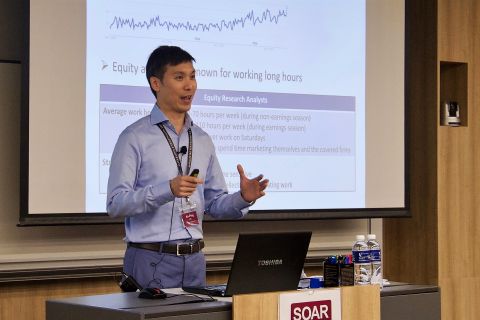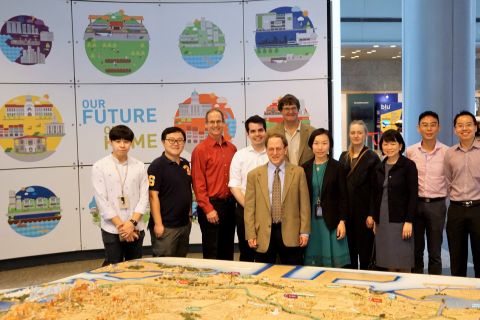
Above: Associate Professor Lim Chee Yeow of the SMU School of Accountancy presenting his study titled ‘Tax Knowledge Diffusion through Individual Auditor Network Ties: Evidence from China’.
By Sim Shuzhen
SMU Office of Research & Tech Transfer – Just as individuals thrive on social ties, so too do companies, which gain valuable information and new ideas through the social connections of their employees, executives, directors and other stakeholders.
For example, a company trying to minimise its taxes would benefit from connections that improve its access to knowledge of tax savings strategies. While previous research suggests that tax avoidance knowledge is shared among firms through directors who sit on multiple corporate boards, another possible conduit of information remains relatively unstudied – auditors.
“Auditor network ties could facilitate transfer of information among the clients of an audit partner,” said Associate Professor Lim Chee Yeow of the Singapore Management University (SMU) School of Accountancy. “Audit partners tend to have an information advantage – for example, they develop a deep understanding of clients through auditing their work, as well as through formal and informal communications with top executives at client firms.”
Together with collaborators at the University of California, Irvine, Tsinghua University and Jinan University, Professor Lim is investigating how audit partners influence the diffusion of tax avoidance knowledge among firms in China, where connections or guanxi play a big role in business dealings, he said. He presented the study, titled ‘Tax Knowledge Diffusion Through Individual Auditor Network Ties: Evidence From China’, at the SMU School of Accountancy Research (SOAR) Symposium, held from 12-13 December 2018.
More than just auditors
While audit partners could potentially transfer tax avoidance strategies between their clients, there are also reasons for them to choose not to do so, said Professor Lim. “The basic role of an audit partner is to provide an opinion on the firm’s financial reporting, so there’s no obligation for them to share tax information with their clients,” he explained. “In addition, audit partners may also have concerns about litigation – some tax strategies could be very risky and could be challenged by tax regulators, which could expose the partners to litigation risks.”
To investigate the extent to which audit partners disseminate tax knowledge, Professor Lim and his collaborators examined the association between auditor network ties and effective tax rates across a large sample of listed companies in China.
They found that firms with audit partners who have more connections to ‘low-tax firms’ – firms in the sample with the lowest effective tax rates – themselves also paid lower effective tax rates, consistent with the idea that individual audit partners disseminate tax avoidance knowledge from low-tax firms to their other clients, said Professor Lim.
Interestingly, this association was only observed at the level of individual audit partners, and not at level of audit firms; this suggests that simply sharing an audit firm with a low-tax firm is insufficient for the diffusion of tax avoidance practices, Professor Lim explained.
Learning and transferring – a social process
Having found evidence that audit partners play a role in spreading tax avoidance strategies between clients, the researchers next delved deeper into how this dissemination – which involves both learning and transfer of information – is carried out.
They found that the effect of audit partner connections to low-tax firms was more pronounced when audit partners had longer tenures in these firms, supporting the idea that audit partners learn tax strategies while providing their services to low-tax firms, said Professor Lim. “We believe that long tenures with low-tax firms allowed the audit partners to have a better understanding of the strategies, including tax savings strategies, used by these firms,” he explained.
After picking up these strategies from low-tax firms, audit partners then need to communicate them to their clients. The researchers found that the effect of audit partner connections to low-tax firms was also stronger when audit partners had more school ties with the top executives of client firms, suggesting that social connection – in this case, a common educational background – also facilitate the transfer of tax avoidance information.
“Social ties between connected partners and top executives may increase the trust among them; this is especially important when the tax avoidance activities are riskier. Audit partners are more likely to share sensitive information with someone they are comfortable with,” explained Professor Lim.
The power of individual connections
One of the most interesting questions raised by Professor Lim’s findings is why dissemination of tax avoidance strategies in China seems to occur only at the level of individual audit partners, and not at the audit firm level, said Professor TJ Wong of the University of Southern California’s Marshall School of Business, who acted as the paper’s discussant.
“Is the knowledge something that you can’t transfer [at the firm level] because it’s not technical knowledge… and it has to be [transferred] through relationships? Is it related to the type of tax avoidance in China that is unique compared to the US?” he asked, adding that teasing apart different types of knowledge transfer could make the study even more interesting.
To strengthen the study, Professor Lim and his coauthors are examining several factors other than knowledge diffusion that also could impact effective tax rates, such as help from tax consultants; he noted, however, that the tax consulting industry in China is not well developed and therefore is less likely to play a key role.
Overall, the study adds to very limited prior research on the diffusion of tax avoidance through auditors, said Professor Lim. “We show that individual audit partners have an important bearing on firms’ tax avoidance, and provide some new evidence that the effect of network ties is more pronounced when audit partners and client executives have common school ties,” he concluded. “These results suggest that social ties are an important dimension [of knowledge diffusion], especially in China.”
Back to Research@SMU February 2019 Issue
See More News
Want to see more of SMU Research?
Sign up for Research@SMU e-newslettter to know more about our research and research-related events!
If you would like to remove yourself from all our mailing list, please visit https://eservices.smu.edu.sg/internet/DNC/Default.aspx

